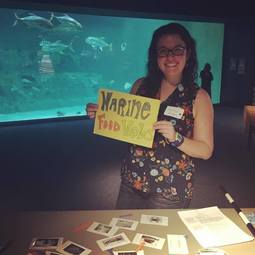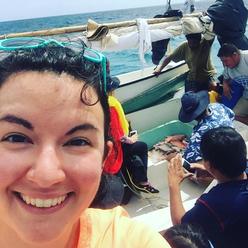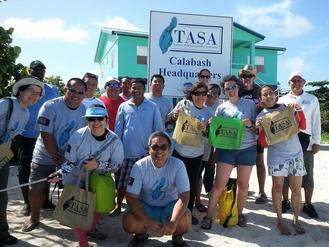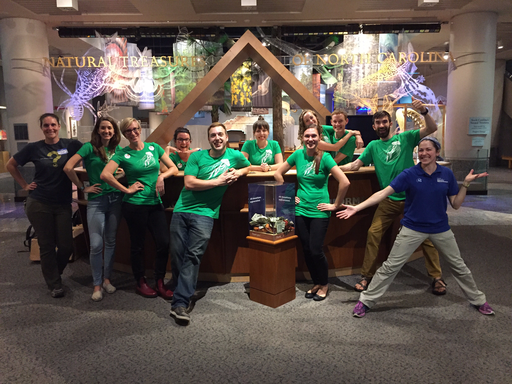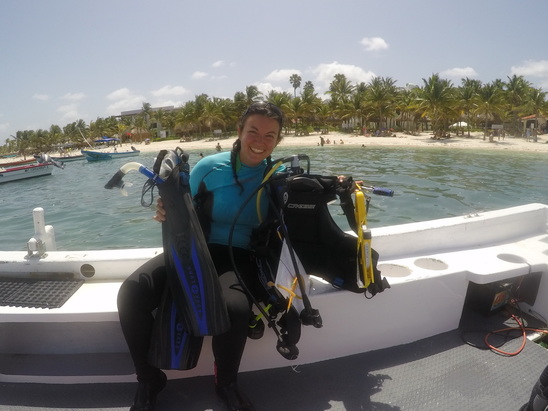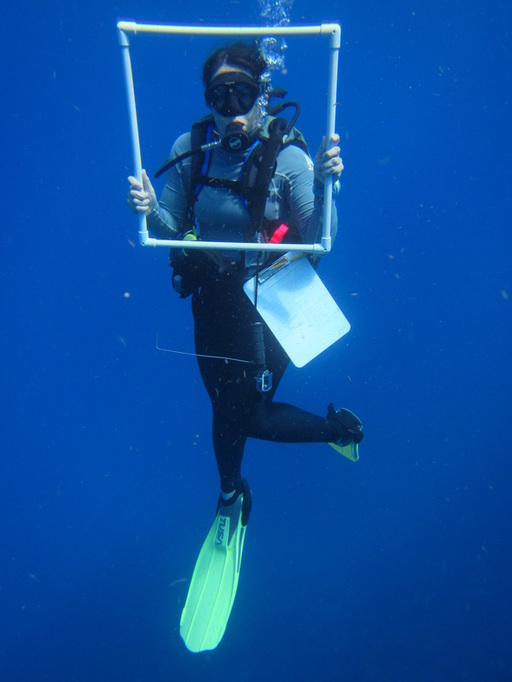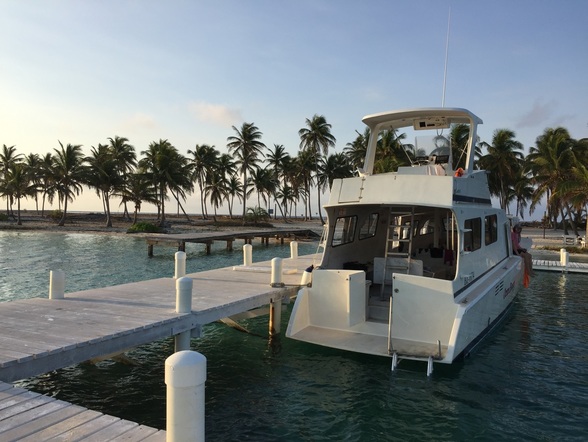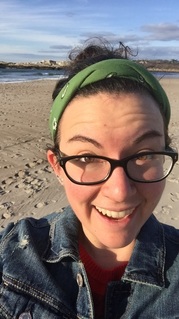As 2017 comes to a close, I wanted to feature my milestones of the past year. From outreach events, to fieldwork, to keeping up with research, 2017 has been a year for the books! I am looking forward to maintaining this momentum for 2018.Winter/Spring:January 21-22: Participated in science communication training workshop known as IMPACTS (Inspiring Meaningful Programs and Communications through Science) organized by the Morehead Planetarium and Science Center. Through the workshop, we became trained to be Science Communication Ambassadors, developing outreach materials and programming for the North Carolina Science Festival and classroom visits.
March 24: Presented "MPAs did not mitigate coral reef phase shifts in Belize caused by disease and warming" at 5th Annual Environment and Ecology Student Symposium. I was one of the co-organizers of this event, which featured oral and poster presentations from graduate and undergraduate students from UNC, Duke, and NC State. April 12-15: Attended and presented at the 2017 Benthic Ecology Meeting in Myrtle Beach, SC. Presented talk titled: "MPAs did not mitigate coral reef phase shifts in Belize caused by disease and warming." April 22: Collaborated with graduate students in Dr. Karl Castillo's lab to offer hands-on activities about coral reef ecology and physiology, SCUBA diving, and marine conservation at the North Carolina Science Festival. April 27: Shared my research with middle school students at Culbreth Middle School's Science Day. Summer:May 22 - June 8: Traveled to Belize to collect preliminary data about fisheries management initiatives and to network with in-country collaborators at the Belize Fisheries Department and numerous environmental organizations. I visited Belize City, Placencia, Caye Caulker, and Punta Gorda. Fieldwork supported by UNC's Curriculum for the Environment and Ecology and Institute for the Study of the Americas. June 10: Began training and coursework for PADI Divemaster with Water World SCUBA and Marine, in Durham, NC. The Divemaster is a professional level of SCUBA diving, whereby individuals lead teams of divers, assist with open water courses and other related diving instructions. This was one of my goals since I became SCUBA certified in 2011, and only enhances my diving leadership skills. June 27: UNC's Summer Session II began, and I taught two laboratory sections for BIOL 252: Human Anatomy and Physiology. July: Continued TA'ing, and made progress on preliminary data analysis for project examining long-term trends in coral community dynamics in Belize. Fall/Winter:August 19: Co-organized SciREN Triangle Lesson Plan Workshop in Raleigh, NC. September 21: Co-organized SciREN Networking Event in Raleigh, NC. September 25 - October 6: Returned to Belize for additional meetings and networking with in-country collaborators at the Belize Fisheries Department and the Toledo Institute for Development and Environment (TIDE). October 13: Completed all requirements for PADI Divemaster! October 16: Matched with middle school pen-pal through the Letters to a Pre-Scientist Pen Pal program. We send hand-written letters to each other every few months.
November and December: Continue preliminary data analysis, applying to external research grants, coursework in statistics, and planning 2018 research projects.
1 Comment
This past summer (2016), I started the fieldwork component of my dissertation research on coral reef ecology with Dr. John Bruno by conducting research in Belize and Mexico. In May, I traveled to Belize with Laura Mudge (Biology PhD student in the Bruno Lab) and Caroline Jasperse UNC’18. In a small SCUBA dive shop in Belize City, we met up with Dr. Bruno, Dr. Courtney Cox (former Bruno Lab member and now at the Smithsonian), and Jenny Hughes UNC’16. We spent about a week traveling between islands examining patterns in fish populations and benthic community composition (like corals, sponges, and algae) at sites across the Belize Mesoamerican Reef. This coral reef is the second largest barrier reef system in the world, and is traced by numerous small islands (or “cayes”) that were formed by ancient coral reefs rising out of the ocean. The amount of human influence around the cayes is different depending on where you are – some areas are closed to fishing and deemed marine reserves, while others are general use zones. Because of this, we expected there to be differences in fish populations and benthic community composition across sites and management regimes. At the study sites, we used SCUBA to lay out transects to count fish, obtain underwater images of the seafloor (using a GoPro!), and count juvenile coral recruits. This study was a part of a long-term monitoring project that began in 1999 between Dr. John Bruno and collaborators. This year, I am currently collaborating with Zachary Locklear UNC’17 to analyze the underwater images from 2016, 2009, 2006 and 1999 to understand how the trends have changed over time. After Belize, I traveled to Akumal, Mexico, with Laura Mudge to conduct a study for her dissertation on the role of herbivores – like sea urchins and parrotfish – in the recovery of Elkhorn coral (Acropora palmata). The long-spine sea urchin (Diadema antillarum) and Acropora suffered mass mortalities in the last several decades throughout the Caribbean, but are rather abundant along the Yucatan peninsula in Mexico. The small town of Akumal, Mexico, became the perfect location to determine if the presence of Diadema was somehow facilitating the growth of the Acropora by keeping algal levels low enough for the Acropora to extend its calcium carbonate skeleton and grow. In order to do this, we used SCUBA to conduct over 55 underwater transects across 12 sites estimating size and abundance of parrotfish species, measured Elkhorn coral size (and health status), and used a GoPro to take pictures of the seafloor. The results are still being analyzed, but we are finding some interesting trends between Diadema abundance and Acropora abundances – stay tuned! These two projects – in Mexico and Belize – sparked the beginning of my dissertation work in coral reef ecology, fisheries management and interdisciplinary marine conservation efforts. I am thankful for the generous support from UNC's Curriculum for the Environment and Ecology for providing travel funds to these locations. I hope to return to Belize in 2017 to conduct a study combining social science surveys with ecological fish surveys to determine if the recently implemented rights-based fisheries management restores ecological function and improves livelihood of fishers. This project will draw upon personal connections that I made while in Belize in summer 2016 as well as partnerships with the Environmental Defense Fund and the Belize Fisheries Department. Community-based environmental management techniques are emerging as some of the most promising ways to combat overfishing, and I look forward to becoming a part of that endeavor. Hi everyone!
Welcome to my blog/website! This is my first blog post of my graduate career -- how exciting! It only took almost a year of graduate school for me to buckle down and generate my own website... Alas, that's grad school for ya! The last time I blogged was during the summer before my senior year of undergrad -- it was left over from my time abroad in Bonaire. Feel free to check it out and see how far I've come! My hope for this website is to have a place for me to write about research updates, happenings in marine conservation, and exciting discoveries in natural sciences. One of my interests is in bridging the gap between the scientific community and the general public and I hope this site will help do just that. It will also give me a chance to develop as a young professional in an increasingly connected world -- keeping my social media, academic, and professional spheres all together in one place! How convenient! Furthermore, I will be embarking on several excursions to Belize and Mexico this summer for the first installment of data collection for my dissertation! I hope to update this site with news, pictures, and videos of those experiences. Thanks so much, and stay tuned for more posts! Fair winds, Catie |
BioHi! I am currently a graduate student in Dr. John Bruno's lab at the University of North Carolina at Chapel Hill. I am pursuing a PhD in Ecology through the Curriculum for the Environment and Ecology. Broadly, my research interests include coral reef ecology, ecosystem-based fisheries management, and tropical marine conservation. I hope to become an integrative part of connecting academics, natural resource managers, and local communities to achieve common goals. Archives
December 2017
Categories |
